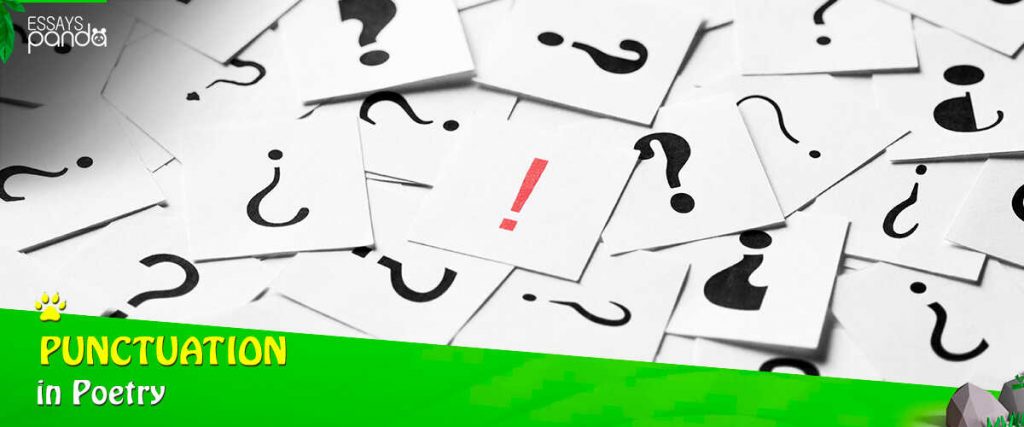Punctuation in Poetry

Each poet has his or her unique style and follows it when creating their masterpieces. Nevertheless, there are certain punctuation rules that should be followed by all people, who want to succeed in poetry writing. If you want to learn more about punctuation in poetry and in academic writing, just keep reading this guide and you will figure out what poetry grammar standards you need to follow.
Punctuation and Capitalization in Poetry
Poets use appropriate punctuation not only for conveying their messages clearly but also for making their ideas sound better and impressing their audience. In terms of punctuation, poetry gives freedom to authors because:
- There is no need to put every dash or comma in the appropriate place. The poet just needs to check if it fits the rhythm. If the author has a perfect aesthetic taste, the violation of some grammar rules can be forbidden;
- There is no need to start each line with a capital letter. Although it was required earlier, now poets can decide if they want to follow this tradition or not;
- The poet is allowed to use any punctuation mark anywhere in the text as long as it helps him or her communicates their ideas or insights.
Common Punctuation Types in Poems
There are several essential types of punctuation in poetry. Below, you will find their descriptions:
- Enjambment. There is no punctuation mark at the end of the line because the same idea continues in the next line;
- Caesura. There is a punctuation mark in the middle of the line that aims to make a pause;
- End stop. There is a punctuation mark that is put at the end of the line;
- No punctuation. Many contemporary poets do not use any punctuation allowing their readers to decide when they want to have pauses within the poem.
Typical Grammar Mistakes in Poetry
There are several typical flaws committed by poets. Of course, we are all humans and can commit mistakes but it is better to know how to avoid them.
Commas in poems.
We often make a mistake when citing the poetry works of other people. When you need to cite the idea expressed by the poet, you need to leave it as it is, without changing anything. Thus, if you need to cite a poet, who has made several obvious mistakes in his or her poem, you need to cite it without changing anything. For instance, E.E. Cummings consciously ignored all the punctual letters. If you need to cite him in your paper, you will need to keep his poem as it is;
Subject-verb agreement.
Believe it or not, but it is one of the most frequently committed mistakes.
For example:
Incorrect: He have a few hours left;
Correct: He has a few hours left.
Introductory element.
If you begin your sentence with an introductory word, it should be followed by a comma:
Incorrect: Before she met him she was looking terrible.
Correct: Before she met him, she was looking terrible.
Its and it’s.
This mistake often occurs in texting communication. When communicating through social media platforms people used to simplify their language and put apostrophes in incorrect places. When you say “it’s” you should understand that it is a shortened version of “it is” whereas “its” means belonging.
Incorrect: Its great to be here!
Correct: It’s great to be here!
Compound sentence punctuation.
When writing a compound sentence, do not forget to use a comma between its parts. Even if you want to express your creativity, it is better to use a comma in order to facilitate the understanding of the message to your reader.
Incorrect: They were excited and they were passionate and they were in love.
Correct: They were excited, and they were passionate, and they were in love.
Inappropriate words.
Sometimes, our word choice may be incorrect. You may confuse the following words:
Accept/except;
List/least;
Hear/here.
Too many commas.
Sometimes, when the writer is not sure if the comma is needed, he or she puts it anyway. However, you should understand that putting too many commas in your paper is also a mistake. Pay attention that in some cases, a comma is not necessary:
Incorrect: He visited London, because it was his dream;
Correct: He visited London because it was his dream;
Spacing.
When writing your poem or paper, you should pay special attention to formatting because the violation of formatting standards will not allow you to get a good outcome:
Incorrect: If you are dreaming about something,you should have faith in it.
Correct: If you are dreaming about something, you should have faith in it.
Their, they-re, and there.
These words are often confused as a result of language simplification. Have a closer look at how these words should be used:
Their – something belongs to them;
There – location or place;
They’re – a shortened version of they are.
Me and I.
In fact, it can be pretty tricky to understand what word should be used in a particular case. Have a look at the samples provided below, and you will figure out how to use them right:
Incorrect: When you are done with your report, send it to George and I.
Correct: When you are done with your report, send it to George and me.
You may be interested: Tips for Writing Poetry
What to Consider in Poem Punctuation?
Knowing how to follow the main punctuation rules in your poem, you will significantly improve its readability by communicating your thoughts in a clear way. Pay attention that grammar is very important since it shows your proficiency as a writer. However, if you have no idea how to punctuate poetry or you need professional help with writing your poem, you can always rely on our editing service. Here, at our writing platform, you can buy a poem on any topic and relax because our talented and creative poetry writers will provide you with a juicy masterpiece that will bring you the best outcome. They have vast experience in creating poems and other academic writing pieces. Remember that numerous grammatical mistakes will greatly affect the meaning of your poem. Thus, if you want your reader to enjoy your work, you need to do everything perfectly.




